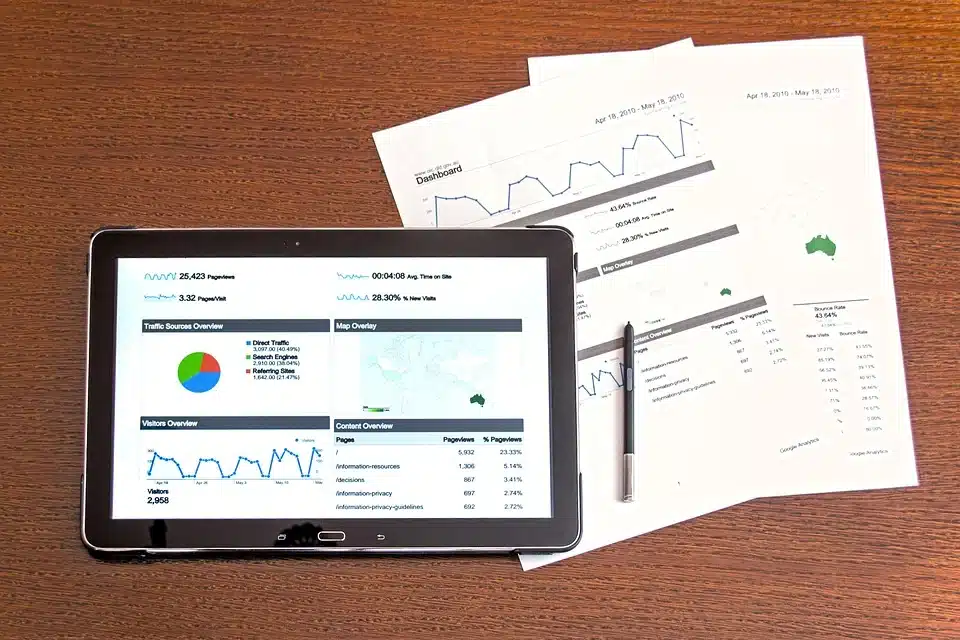Listen to this blog
As technology advances, business analytics has become the main focus for companies looking to expand and increase their revenue. From hospitality to e-commerce, agriculture, and more, business analytics (BA) is everywhere. In April 2022, there were 30% more open analytics and data science jobs, according to statistics from Imarticus Learning, a professional education company. As companies increasingly rely on data-driven insights to enhance efficiency, improve customer experiences, and boost profitability, the demand for skilled professionals in this area is soaring.
What’s particularly interesting is the increasing recognition that diverse backgrounds (technical and non-technical) contribute valuable perspectives to the analytics field. Mechanical engineering is one of these varied backgrounds. Because of their solid background in quantitative analysis, mechanical engineers are well-suited to move into business analytics. If they receive the proper training, they can use their analytical abilities to support businesses in thriving in a data-driven world.
Let’s dive deeper into a business analytics career for mechanical engineers and understand what skills mechanical engineers need for business analytics.
Why business analytics for mechanical engineers?
Mechanical engineers possess a range of skills that are highly valuable in business analytics. These skills create a strong foundation for individuals looking to transition to business analytics from mechanical engineering, allowing them to leverage their technical expertise in a new and impactful way. Below are a few of these transferable skills:
| Problem-Solving |
| Critical Thinking |
| System Thinking |
| Project Management |
| Data Visualization |
| Process Optimization |
| Technical Proficiency |
- Problem-Solving Skills
This non-technical skill helps engineers assess business challenges, recognize complex problems, and create feasible solutions. Problem-solving abilities are essential for engineering projects to succeed, and they also apply well in business analytics, where making decisions based on data is essential for addressing organizational issues.
- Analytical Thinking
Engineers are trained to break down complex problems into manageable parts, allowing for thorough analysis and insight generation. They use logical reasoning to manage these chunks, guaranteeing an organized approach to problem-solving.
- Systems Thinking
Understanding how various components of a system interact allows engineers to analyze business processes holistically, optimizing performance across departments. Systems thinking skills enable engineers to analyze and optimize processes effectively, making them valuable assets in both engineering and business analytics, where understanding complex interrelationships is crucial for driving strategic decisions.
- Project Management
Mechanical engineers often manage projects, making them adept at planning, resource allocation, and meeting deadlines, which are key skills in any analytics role. They are used to managing projects from origin to completion, making sure that resources, finances, and schedules are properly controlled. In business analytics, where overseeing data-driven projects calls for similar organizational and leadership skills, this experience is invaluable.
- Data Visualization
Experience with engineering software, including visualization and interpretation tools, helps engineers present data clearly and actionably. This skill applies directly to business contexts, where the ability to present data clearly can influence decision-making and drive strategic initiatives.
- Process Optimization
Engineers usually receive process optimization training and are always looking for methods to improve performance and efficiency. This kind of thinking is essential in business analytics, where process analysis and potential for change can result in significant cost savings and improved operational efficacy.
- Technical Proficiency
Engineers are normally proficient in industry-specific software tools, such as CAD (Computer-Aided Design), MATLAB, or simulation software, which aid in design and analysis. Many engineers have coding experience in languages such as Python, C++, or R, allowing them to automate tasks, analyze data, and develop algorithms. Familiarity with programming languages and software (like MATLAB or CAD tools) can be easily adapted to analytics tools such as Python, R, or SQL.
Bridging the gap: Building your skillset
To successfully transition to business analytics from mechanical engineering, you must build your analytics skill set. Several online courses and boot camps are available to help, which we will discuss further in this blog. These boot camps or courses can enhance your knowledge in the field, making you a valuable asset in the job market.
- Datacamp – SQL
You will learn how to use SQL, one of the most widely used languages in business analysis, in this course. Everything from writing queries to building and linking tables will be covered. By the end of this course, you will know how to use SQL to quickly and effectively analyze massive amounts of data.
- Springboard
Springboard’s curriculum teaches students how to tell an engaging data story to educate and convince stakeholders and how to make clear and easy-to-understand graphs to display facts. This course provides structured learning, hands-on experiences, and dedicated professional mentoring.
- Dataquest
This self-paced, independent learning platform provides all the guidance you need to finish your coursework and prepare for the workforce. The curriculum covers a variety of analytics subjects and skills, such as an introduction to Python programming, intermediate Python with Pandas, and more.
MSc Data Science from MAHE
The MSc in Data Science from MAHE (Manipal Academy of Higher Education) is an excellent option for those looking to deepen their knowledge and skills in data science and analytics. Here are some highlights of the course:
- The program’s extensive curriculum ensures a solid foundation in a variety of subjects, such as statistical methods, machine learning, data mining, and big data analytics.
- Students participate in case studies and practical projects, which give them real-world experience and allow them to apply their theoretical knowledge to real-world problems.
- The curriculum places a strong emphasis on integrating different subjects, allowing students to understand how data science can be used in a variety of industries, including marketing, finance, and healthcare.
- MAHE frequently works with industry partners to provide students with networking opportunities and information about the latest trends and practices in the field.
- The program’s faculty are seasoned professionals who bring both academic knowledge and business experience to the classroom, improving the learning environment.
By pursuing online courses, boot camps, or a structured program like the MSc Data Science from MAHE, aspiring professionals can effectively navigate the mechanical engineer to business analytics path.
Technical skills development
Focusing on programming languages, data analysis tools, and visualization platforms will significantly enhance your technical skill set in business analytics. Whether you choose to learn through online courses, boot camps, or formal education, mastering these skills will position you for success.
Programming Languages
- Python
Python’s robust machine learning tools, such as sci-kit-learn and TensorFlow, help identify trends and patterns in large data. They even speed up data collection by automating processes.
- R
With its many libraries for time-series analysis, forecasting, and complex information visualization, R is an effective tool for statistical analysis, big data, and machine learning. Its advanced tools make it simple to create personalized PDFs and interactive graphs.
- SQL
One of the most crucial tools in an analytics professional’s toolbox is SQL. Due to its ability to handle structured data efficiently, it plays a crucial role in business analytics, data science, and software development.
Data Analysis Tools & Software
- Excel
Excel is a popular application for data analysis in many fields, including business and finance, because of its intuitive interface and adaptability.
- Qlik Sense
With its intuitive interface, powerful analytics capabilities, and strong community, Qlik Sense can significantly enhance your data analysis and reporting skills.
- SPSS
A popular statistical analysis program, SPSS (Statistical Package for the Social Sciences), is especially useful in the social sciences, health sciences, and market research. It provides a full range of features for reporting, statistical analysis, and data management.
Data Visualization Platforms
- Google charts
Google Charts is a well-liked free choice for experts who want to create interactive data visualizations. The application can create charts and pull data from multiple sources, such as Google Sheets, Salesforce, and SQL databases, making them highly accessible. Bar charts, pie charts, histograms, geo charts, and area charts are among the eighteen chart kinds it provides.
- Infogram
Infogram is another popular tool for making maps, reports, and infographics. Since it can be used to generate infographics, Infogram stands out from the other tools on this list and is particularly well-liked among creative professionals.
- D3.js
D3.js (Data-Driven Documents) is a tool for creating unique and dynamic data visualizations. Developers and data visualization specialists choose it because it offers unmatched control and flexibility. For producing one-of-a-kind, complex, and highly interactive visualizations that are customized to meet particular requirements, D3.js is the perfect tool.
Business acumen
Besides technical skills, strong business acumen is also a must for transitioning from a mechanical engineer to a business analytics path. Here are some suggested electives and courses in business fundamentals that you can pursue to enhance your expertise in the field:
- Principles of Marketing: A solid understanding of branding, consumer behavior, and marketing techniques can help you more successfully assess market trends and customer preferences.
- Financial Accounting: This course covers the fundamentals of financial statements, reporting, and analysis and offers insight into business performance indicators and overall financial health.
- Operations Management: This course helps you comprehend operational efficiencies and learn about supply chain management, process optimization, and quality control.
- Economics for Managers: Learn about macro and microeconomic concepts that will help you comprehend market dynamics and the business environment.
- Consumer Behavior Analysis: This elective delves into the psychological and social factors influencing consumer decisions, providing valuable insights for market trend analysis.
Additional Resources
- Market Research Reports: Access reports from organizations like IBISWorld, Statista, or more to stay updated on industry trends and insights.
- Trade Journals and Magazines: Subscribing to industry-related publications can provide ongoing insights into market developments and emerging trends.
- Webinars and Conferences: Participating in industry webinars or conferences can provide networking opportunities and insights from experts on current trends and future predictions.
By taking these courses and engaging in research activities, you’ll be well-equipped to understand and analyze market trends and apply that knowledge effectively in business analytics.
Making the transition: Landing your first business analytics job
Here’s how you can make your transition to business analytics from mechanical engineering smoother.
- Tailor your resume and cover letter
Highlight technical skills like programming, data analysis tools, and problem-solving, and showcase relevant experience in data analysis projects. For every job you apply for, tailor your cover letter and resume to the job’s requirements. Ensure a clear structure with clear sections like summary, skills, experience, and education.
- Build your business analytics portfolio
Showcase your work through a portfolio that includes real projects, diverse examples, and case studies, and regularly update it with new projects or skills as you gain experience or complete relevant courses. Showcase your work on personal websites or services like GitHub.
- Leverage your network
Inform your network about the transition, attend networking events, optimize your LinkedIn profile, request informational interviews, and join professional groups. These strategies can help you meet professionals, learn about job opportunities, and expand your network. Participating in industry conferences, meetups, and webinars can also help you find suitable professionals.
Success stories: Mechanical engineers in business analytics
- “I wanted a position where I could integrate my technical expertise with business strategy and decision-making; thus, I signed up for a business analytics course. The curriculum offered by the platform boosted my competence and confidence. Even before I entered the industry, I felt ready for its challenges.” – Swetali Darade
- “Though I come from the mechanical engineering background, I worked as a Lead Data Analyst in an organization. With the guidance and support, from faculties, I improved my coding skills, data analytics, and machine learning.” – Sushanth Sugunan
For engineers wondering which analytics positions they should look for, many diverse career paths within business analytics are available, like the following:
- Supply Chain Analyst
Supply chain analysis involves optimizing supply chain processes by analyzing data related to inventory, logistics, and supplier performance. Skills required are data modeling, forecasting, and an understanding of supply chain management principles.
- Manufacturing Analyst
This involves analyzing production processes and data to improve efficiency, reduce waste, and enhance product quality. Skills required are process optimization, statistical analysis, and familiarity with manufacturing systems (like Lean and Six Sigma).
- Healthcare Analyst
A healthcare analyst analyzes healthcare data to improve patient outcomes, operational efficiency, and resource allocation. Skills required are data analysis, an understanding of healthcare metrics, and familiarity with healthcare regulations.
- Risk Analyst
A risk analyst assesses potential risks that could affect the organization’s financial health and operational stability. Skills required are statistical analysis, risk modeling, and familiarity with regulatory requirements.
Conclusion
A business analytics career for mechanical engineers offers numerous advantages. By leveraging strong analytical skills, problem-solving abilities, and technical expertise, engineers can successfully navigate the data-driven landscape of business management. To support your transition into business analytics, get a degree or certification from learning platforms such as Online Manipal, which offers you professional certificates and micro-degrees in data science and analytics.
Additionally, make sure to join relevant groups focused on business analytics to connect with professionals. Take advantage of career development resources such as Glassdoor or Indeed career guide to transition into a rewarding career in business analytics, poised for success in today’s data-driven world.
Become future-ready with our online M.Sc. in Business Analytics program








